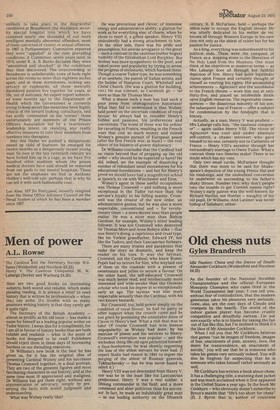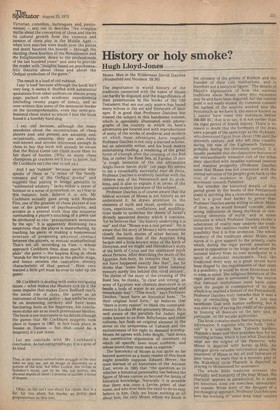Old chess nuts
Gyles 13randreth
Idle Passion: Chess and the Dance of Death Alexander Cockburn (Weidenfeld and Nicolson £4.25)
As the founder of the National Scrabble Championships and the official European Monopoly Champion who came third in the World Tournament last year, I can tell you, without fear of contradiction, that the modern gamesman takes his pleasures very seriously. Gone, alas, are the cosy days of Cleudo and crumpets by the hearth. The world of the indoor games player has become cruelly competitive and dreadfully earnest. I'm not sure exactly who is to blame for taking the fun out of fun like this, but I'm inclined to think it's the likes of Mr Alekander Cockburn.
When I tell you that Mr Cockburn believes that games "can be images of freedom, images of fear, enactments of pain, anxiety, love, the desire for transcendence, an enactment of suicide," you will see that he is someone who takes his games very seriously indeed. You will also be forgiven for suspecting that he is someone who takes himself rather seriously as well.
• Mr Cockburn has written a book about chess. It has a challenging title, a stunning dust jacket and was much acclaimed when it first appeared in the United States a year ago. In the book Mr Cockburn — who obviously doesn't subscribe to Byron's maxim that "life's too short for chess" (H. J. Byron that is, author of countless Victorian comedies, burlesques and pantomimes) — sets out to describe "the complex myths about the conception of chess and traces its cultural growth from the violence and passion of chess play in the Middle Ages — when love matches were made over the pieces and death haunted the boards — through the dazzling chess hustlers of the Renaissance and the Enlightenment, down to the professionals of the last hundred years" and aims to provide the reader with "insights based on psychoanalytic theories about chess and about the Oedipal symbolism of the game."
The result is a load of old rubbish.
I say 'a load' because although the book isn't very long, it seems it. Stuffed with substantial quotations from other authors on almost every page, packed with academic impedimenta (including twenty pages of notes), and so over-written that some of the sentences border on the incomprehensible, even the semi-professional chess zealot to whom 1 lent the book found it a horribly hard slog.
1 say 'old' because, although the many anecdotes about the eccentricities of chess players past and present are amusing and, occasionally, amazing, they are also fairly well-known and anyone interested enough in chess to buy this book will already be aware that the Royal Game can claim more than its fair share of loonies. (Why so many chess champions go crackers we'd love to know, but Mr Cockburn isn't the one to tell us.)
And I say 'rubbish' because anyone who speaks of chess as "a mime of the family romance and of the Oedipal drama" and suggests that pairing in bridge amounts to "sublimated adultery," lacks either a sense of humour or a sense of proportion, or, as I fear in this instance, both. Believe it or not, Mr Cockburn actually goes along with Reuben Fine, one of the greatest of chess players if not one of the greatest of psychoanalysts, and accepts as a general truth that the etiquette surrounding a player's touching of a piece can be attributed to two "precautionary measures by the ego." It is apparently dismissing two suspicions: that the player is masturbating, by touching his piece; or making a homosexual overture of proposing physical contact between the players, or mutual masturbation! That's not all: according to Fine — whose approach Cockburn feels does much to "explain" the game — the hapless King in chess "stands for the boy's penis in the phallic stage, and hence• arouses the castration anxiety characteristic of that period." How very warped a little girl must be ever to take up the game!
Mr Cockburn is dealing with some intriguing issues — what makes the Masters tick (is it the same impulse that makes Dave Bedford run?), the social role of chess, the game as an instrument of Soviet policy — but while he may be on interesting territory and have some fascinating facts at his fingertips, his conclusions strike me as so much pretentious blather. The book is not inaccurate in its details (though the games that Mr Cockburn suggests , took place in .Sussex in 1967, in fact took place in Sousse in Tunisia — but that could be a misprint), it's just inane.
Let me conclude with Mr Cockburn's conclusion. As last paragraphs go, it is a gem of its kind: Thus, in the eternal unresolvable struggle of the two sides we may see, not an image of discovery or a portent of the new, but what Luzhin, the victim in Nabokov's novel, saw to be 'the full horror, the abysmal depths of chess'; a process of suicide: a mime of despair.
Okay, so life isn't too short for chess, but it's far, far too short for books as Potty and preposterous as this one.



































 Previous page
Previous page